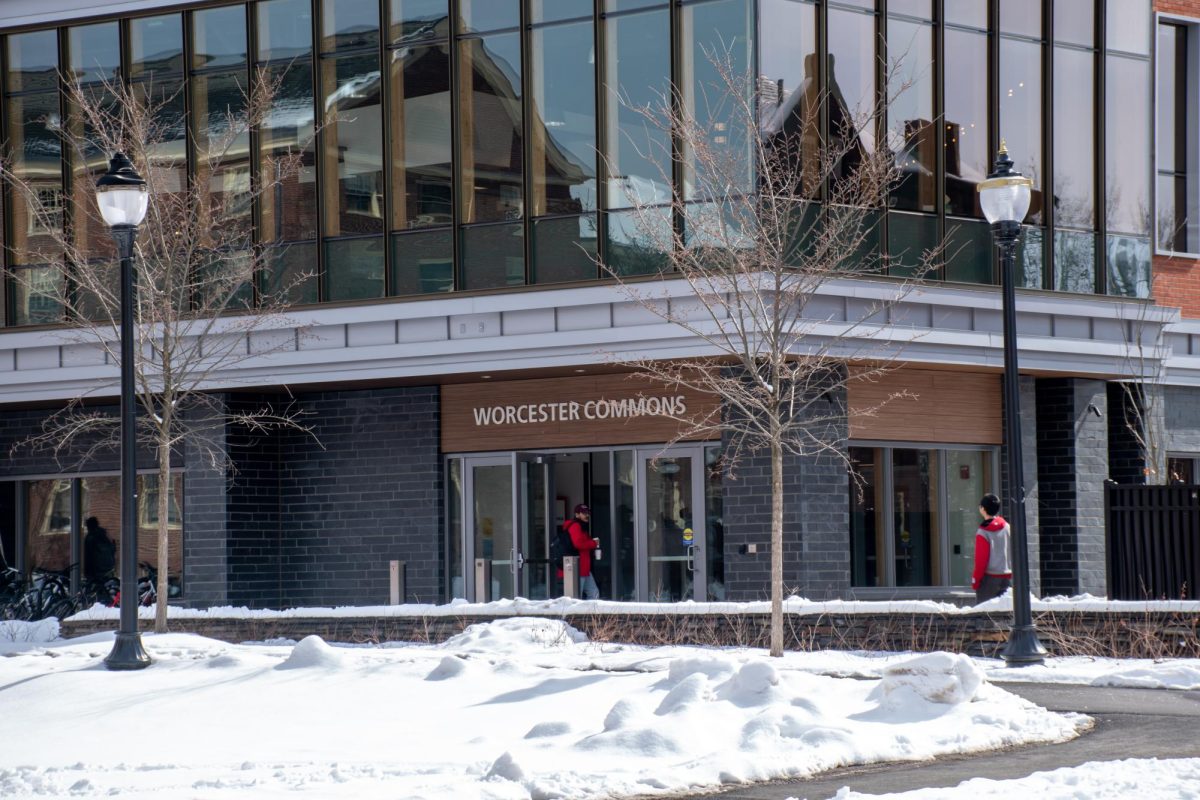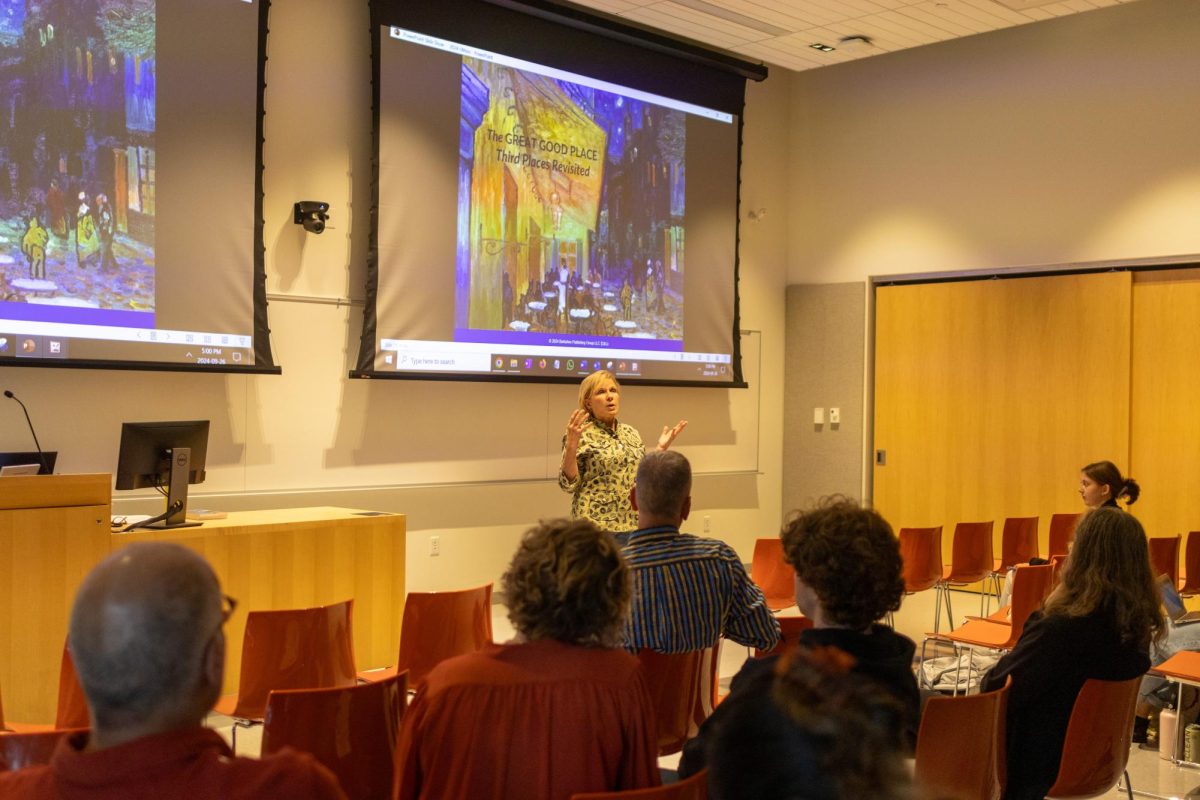Editor’s Note: This is a part of a series on mental health at the University. To protect the privacy of the people reported on, only first names will be used.
“Hi, my name is Sam, and I am an alcoholic.”
That’s how a local Alcoholics Anonymous meeting in February started. They sit and stand, some drinking coffee or eating, all listening.
Michelle sits confidently, talking to her neighbor. She is a recovering alcoholic and drug addict going on seven months sober.
Michelle started out like other alcoholics in the room, as a freshman at the University of Massachusetts drinking and smoking marijuana socially.
Then it led to prescription pill use and other illegal drugs, including cocaine and ecstasy. She said she continued in such a pattern until she couldn’t hold it together anymore and was drinking every day, skipping classes, and ignoring responsibilities,
Then, she said she sought help at the University Health Services and broke down, resulting in a one-year medical leave from the University.
Michelle said the medical leave actually made her addiction worse, as she no longer had school or other responsibilities, so she crawled deeper into her addiction. She pushed off getting sober; continuingly saying ‘I’ll do it tomorrow,’ or ‘this will be my last drink.’
“I was an empty shell of a person, with no emotions but anger and misery, nothing would help but getting high, and then that stopped working,” said Michelle.
Then, she realized drinking and blacking out was not as fun as when she started, and that she had built her whole world around drugs.
Then, Michelle got clean.
She went to rehab and began to take sobering up seriously. After she completed that program, she attended AA meetings every day, where she said she met “beautiful, supportive and fun people.”
She said she had to go through the pain to get better, had to be ready on her own to get clean and complete the 12-step program.
Now clean and sober, she is back at UMass, living in a substance free dorm and has found good friends who keep her sober. She said she feels she understands friendship better now.
Every once and a while Michelle thinks about having a drink, remembering her drinking “started out fun.” Her “alcoholic mind” tells her this next drink will be different.
Then she remembers what it was like to be addicted and thinks of her new support group, and changes her mind.
Adam began using drugs and alcohol at a younger age. At 11, he said he started smoking cigarettes to be cool like his older brother. It led to using and selling marijuana, drinking alcohol and taking opiates.
He was arrested on two counts of selling marijuana, and was sentenced to court-ordered drug counseling to avoid jail time and dropping out of school. However, Adam was still unwilling to admit he had a problem.
To beat the system, he started using drugs that he was not addicted to, switching alcohol brands and trying different drugs.
Then one day, he realized he was “lost” and an addict.
Now, he goes to AA meetings and he leans on his brother, who is in a live-in rehabilitation center, for support. He said his courage comes from AA meetings and group members’ support, hearing their horror stories and realizing such situations could have happened to him.
Nearly one-third of Americans know someone who is, or has had, a drug or alcohol problem, according to Above the Influence, an organization under the auspices of the Offices of National Drug Control Policy that focuses on preventing minors from using substances.
Three percent of college students across the nation are addicted to a substance, and six percent are dependent, said Diane Fedorchak, the project director of Brief Alcohol Screening and Intervention for College Students, more commonly known as BASICS, a program at the University to combat drug and alcohol abuse.
Fedorchak said college is the place where many kids come and explore, sometimes for the first time, trying alcohol and drugs. When the body is not exposed to a substance, it can react very negatively; blackouts, unconsciousness and addiction are some of the scariest results. Alcohol has an array of messy short and long-term effects, including damaging the brain, stomach, liver, kidneys and muscles.
“Each year, approximately 5,000 young people under the age of 21 die as a result of underage drinking; this includes about 1,900 deaths from motor vehicle crashes, 1,600 as a result of homicides, 300 from suicide, as well as hundreds from other injuries such as falls, burns, and drownings,” according to the National Institute on Alcohol Abuse and Alcoholism.
Overconsumption of alcohol can also lead to assault, sexual abuse and unsafe sex, according to the NIAAA.
“More than 100,000 students between the ages of 18 and 24 report having been too intoxicated to know if they consented to having sex each year,” the report found.
The most common form of substance abuse at the University is alcohol, according to Fedorchak, though marijuana and prescription pill abuse are also common.
The Collegiate Recovery Community Drop-in Center was a center opened by University Health Services to help people with recovery from substance abuse. The Center, which opened in November, is a “comfortable, low-stress place for people in recovery, or seeking recovery, to hang out, make connections and find support. Relax on the couch with a cup of fresh-brewed coffee, go online with your laptop, get involved or just chill,” the site encourages those looking for substance free socialization to seek out.
Additionally, The Newman Catholic Center has daily AA meetings, and Mercy House also has a group young people’s meeting every Thursday night. All are welcome at both.
Recovery from substance abuse is a difficult and long process, according to Michelle, one which can lead to pushing away family and friends.
“I just wanted the alcohol and to be alone,” Michelle said about her low point. But with the help of loved ones and recovery programs, Michelle said she will beat it.
Claire Anderson can be reached at [email protected].













BS • Mar 27, 2012 at 8:12 am
Went through something similar, but when I called Mental Health Services trying to get in right away knowing I had a problem, and they were the only place I could go to as my insurance didn’t work here, I was told it was a minimum 2 WEEK wait to even talk to someone. So I sat around waiting for their callback, going deeper and deeper into the hole I dug for myself, which ended up leading to my suspension. When I tried appealing it, I had every piece of documentation they asked for, but told me that problems caused by severe depression wasn’t a good enough reason for getting suspended, and then told that even though I was being treated and doing well that I wasn’t good enough to be here.
Maybe UMass cares more now than they did then, but they really don’t give a crap about the welfare of their current students.
Ed • Mar 27, 2012 at 2:12 am
This article illustrates why I would not let even my worst enemy go to CCPH. The girl goes in, admits that she has a problem (that alone was a major move on her part) and instead of helping her, they kick her out of school.
Boys ‘n’ girls, do we understand the message now? The message is that UMass won’t help you — and you don’t want to ask them for help — EVER….
If you have an alcohol or drug problem, yes, be responsible and deal with it — but don’t ever let the university know you have it, or you won’t be a student anymore…. (There is a reason why they call it Alcoholics ANONYMOUS — remember to give a fake name and have a cover story along the lines of you work at McDonalds in Greenfield and live in a van down by the river….)
For everyone like Michelle, who comes back notwithstanding the incompetence and abuse of CCPH/UHS, there is one, two or probably more who don’t. I fail to see why it isn’t considered malpractice — yes, malpractice, to remove students seeking help from the very support network that can help the most in their recovery, their school routine.
The issue is simple, UMass cares about statistics and not students, and it looks far better for kids with problems not to be here as students, even if worse things happen to them because they aren’t. It is all about the money — UM doesn’t care about students, only money. UHS is not there to help students….
Brian Canova • Mar 26, 2012 at 9:55 am
Great story, great reporting. Should have made A1